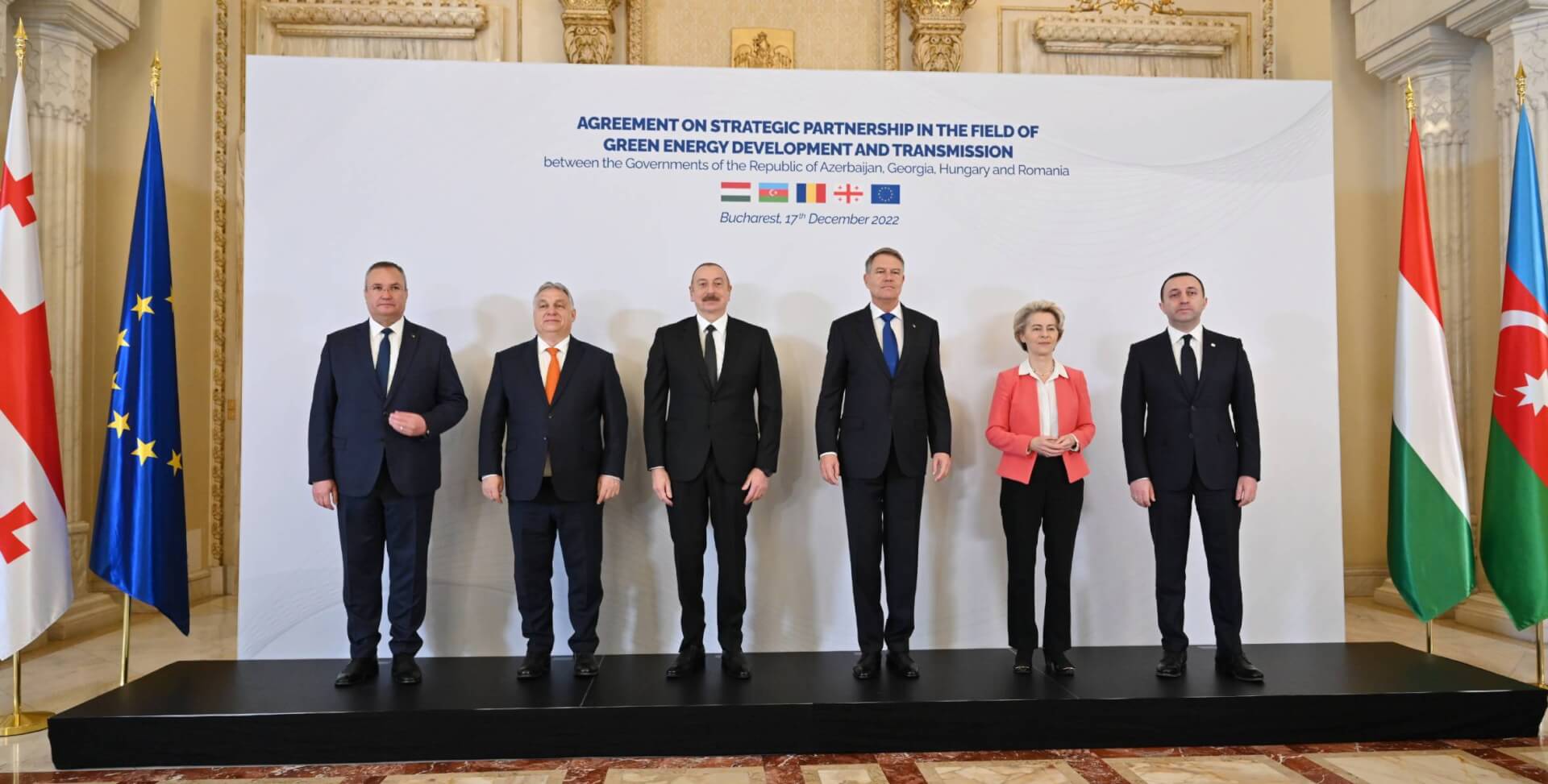The leaders of Azerbaijan, Georgia, Hungary, and Romania inked an agreement in Bucharest on Saturday to construct an underwater electric cable that would supply green energy to Europe as the continent seeks to reduce its dependency on Russia. The cable, touted as a landmark for Europe’s shift to renewables, would carry green electricity from windmills in Azerbaijan to Europe.
The 1,000 MW cable will be 1,195 kilometres (km) long, with 95 km on land and 1,100 km underwater, transferring electricity from Azerbaijan via Georgia to Hungary and Romania. The construction is expected to start next year after the completion of a feasibility report and be completed within six years.
European Commission President Ursula von der Leyen, who was present at the signing ceremony, said the agreement would bring the EU and the South Caucasus closer and help the regions achieve a “clean energy transition.” She also noted that the project could compensate for EU cuts in Russian energy.
The Agreement we sign today will increase our energy security, promote green energy production and distribution, and enhances connectivity in the Black Sea region. 🇷🇴 🇦🇿 🇬🇪 🇭🇺 pic.twitter.com/6oWZavXiUj
— Klaus Iohannis (@KlausIohannis) December 17, 2022
“This is not just about handling a new geopolitical energy situation. It is also about grounding our future in clean, affordable and secure energy sources,” Von der Leyen said. In this respect, she stressed the need for “stronger electricity interconnections” to accelerate the global transition to renewable energy.
She noted that the Black Sea cable could also help Ukraine reconstruct its energy system by transferring electricity from Hungary and Romania.
The United Nations estimates that Russian airstrikes have destroyed over 50% of Ukraine’s energy infrastructure, putting millions at risk of dying due to inadequate heating. Around 40% of the Ukrainian population requires humanitarian assistance to protect themselves from frigid temperatures.
Great privilege to participate in the signing ceremony of the Memorandum of Understanding for the development of the Black Sea electricity cable! The project will unleash new opportunities for the wider region & sustainable energy security infrastructure. pic.twitter.com/F4s7El9scE
— Irakli Garibashvili (@GharibashviliGe) December 17, 2022
Azerbaijani President Ilham Aliyev, meanwhile, said the agreement would cement Azerbaijan-EU energy relations because of Azerbaijan’s contribution to Europe’s energy security. Aliyev also announced that Baku and Bucharest signed a deal to supply natural gas from Azerbaijan to Romania, a move that expands Azerbaijan’s gas supplies to Europe.
In July, the EU and Azerbaijan signed a “strategic energy partnership” to double Europe’s natural gas imports from the South Caucasus country by 2027. Per the deal, Baku will increase its gas exports from 8 billion cubic metres per year to 20 billion cubic metres by 2027 via the Southern Gas Corridor (SGC). The SGC is part of a network of pipelines connecting Georgia, Azerbaijan, Turkey, Greece, Albania, and Italy.
Similarly, Georgian PM Irakli Garibashvili said the deal enhances Georgia’s cooperation with the EU. He said Georgia would serve as a “natural bridge.”
“Present geopolitical challenges and the war in Ukraine has made the need for diversification and resilience even more imperative, in order to address urgent challenges of energy security,” he said.
The Black Sea electric cable is a new transmission route full of opportunities.
— Ursula von der Leyen (@vonderleyen) December 17, 2022
It could integrate Georgia to our electricity market and bring electricity to our neighbours in the Western Balkans, Moldova and of course Ukraine.
Let’s work together to make it real. pic.twitter.com/rDRYDIHYJL
Hungarian Prime Minister Viktor Orbán remarked that the project would allow Europe to move away from Russian energy and strengthen the continent’s energy independence.
“The times of cheap raw material imports from Russia are over. We are here together because we agreed to identify new sources of energy for Europe,” he said.
Romanian President Klaus Iohannis said the agreement would strengthen European cooperation and contribute to Europe’s energy security.
“The Agreement we sign today will increase our energy security, promote green energy production and distribution, and enhances connectivity in the Black Sea region,” he tweeted.
European countries have been trying to reduce their dependence on Russian energy following Russia’s invasion of Ukraine. The EU imports around 45% of its natural gas from Russia. Apart from the deal with Azerbaijan, the bloc also inked an agreement with Egypt and Israel in July to transport Israeli natural gas to Europe via Egypt.
📸 The leaders of Azerbaijan, Georgia, Romania and Hungary signed an agreement on Saturday on an underwater electric cable under the Black Sea to carry green Azeri energy to Europe.
— Mete Sohtaoğlu (@metesohtaoglu) December 17, 2022
📸 @savunmaisleri pic.twitter.com/TblO3HNuyG
In fact, several European countries are signing bilateral energy deals with major natural gas-producing countries.
Last month, Germany agreed to receive two million tonnes of liquefied natural gas from Qatar for 15 years starting in 2027. In July, France signed an energy deal with the United Arab Emirates to increase Abu Dhabi’s energy supply to Paris. Similarly, Italy signed a $4 billion energy deal with Algeria, which has replaced Russia as Italy’s largest energy supplier.
In May, the EU imposed a ban on 75% of Russian gas imports and set a target of 90% for the end of the year. Earlier this month, the G7 countries announced a $60 price cap on Russian oil imports to prevent Russia from profiting from its war on Ukraine.

